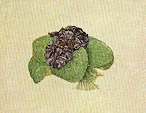
Today we passed through Thoroughfare, Virginia, a small town near upper-class The Plains, Virginia, and saw the marker with the heading, " Free People of Color at Thoroughfare." It turns out that families of African-Americans, Indian Americans, and mixed ancestry migrated to Thoroughfare from Fauquier, Culpeper, Rappahannock, and Warren counties in Virginia after the Civil War. The Allen, Berry, Fletcher, Nickens, and Peyton families, along with former slaves from the area, acquired parts of former plantations, built homes, and established the farming community of Thoroughfare, which prospered through the 1940s. Many of the free people of color who settled in Thoroughfare were illiterate but were of course denied entrance inot the schools and churches of their white neighbors.
As reported in an article in the Fauquier Times Community Newspaper on October 17, 2004, by Tara Slate Donaldson, Victoria Price, whose ancestors helped found the community, says that, "My grandfather told me that Thoroughfare was an auction block, and that, after Emancipation, hundreds of feed slaves converged on Thoroughfare, to find long-lost loved ones who had been sold away from them. The auction block is actually believed to have been at Thoroughfare Gap in Fauquier County not in the community within the boundaries of Prince William County. Victoria Price's mother was of American-Indian ancestry. Her mother's father's ancestors, the Harris Family, wre listed as free blacks and free mulattoes (American Indians were generally listed as mulattoes in Virginia). Her maternal great-grandfather, John Edward Peyton, was an American Indian and a founder of Thoroughfare. She tells the story of how her grandfather left the Tuscorora Inidan nation in North Carolina and walked north to the Catawbas before moving to Buckingham County, were he lived with the Buffalo Ridge Cherokee. From there, he walked to The Plains, where he married Mrs. Price's mother and moved to Thorughfare.
Since the mixed-race children of Thoroughfare were not allowed into the schools of white children, they build their own school in 1885. "People in Thoroughfare had big families," says Mrs. Price who was born in 1906. The school became so overcrowded that soon younger children could not attend classes. The school board refused to allocate funds for the black school, so Thoroughfare residents, who earned only 75 cents to $1 a day, saved their pennies to fund th extra room, which was built in 1899. The land for the school was donated by the Primas family, but the site was so small that that there was no play area for the children.
A cousin of Mrs. Price's is is Pat Fletcher, whose ancestor Frank Scrabble, was an American Indian who left Scrabble, a town in Rappahannock County and walked 45 miles to The Plains. There he met Kate Vass, a black American Indian who was a slave. The two later moved to Thoroughfare, and Frank Fletcher, a master carpenter, built most of the town's houses.
Thoroughfare was predominately self-sufficient. "Most communities were standalone communities where they could survive," says Mrs. Price. "Now they might go up to Beverly Mill, where they could have things ground like sugar, but they had whatever they needed for the community to survive. They had midwives and blacksmiths."
This is only the beginning of the story of Thoroughfare, Virginia, where former slaves and American Indians came together to found a town at the site of a former auction block. For the most part, the history remains hidden.


